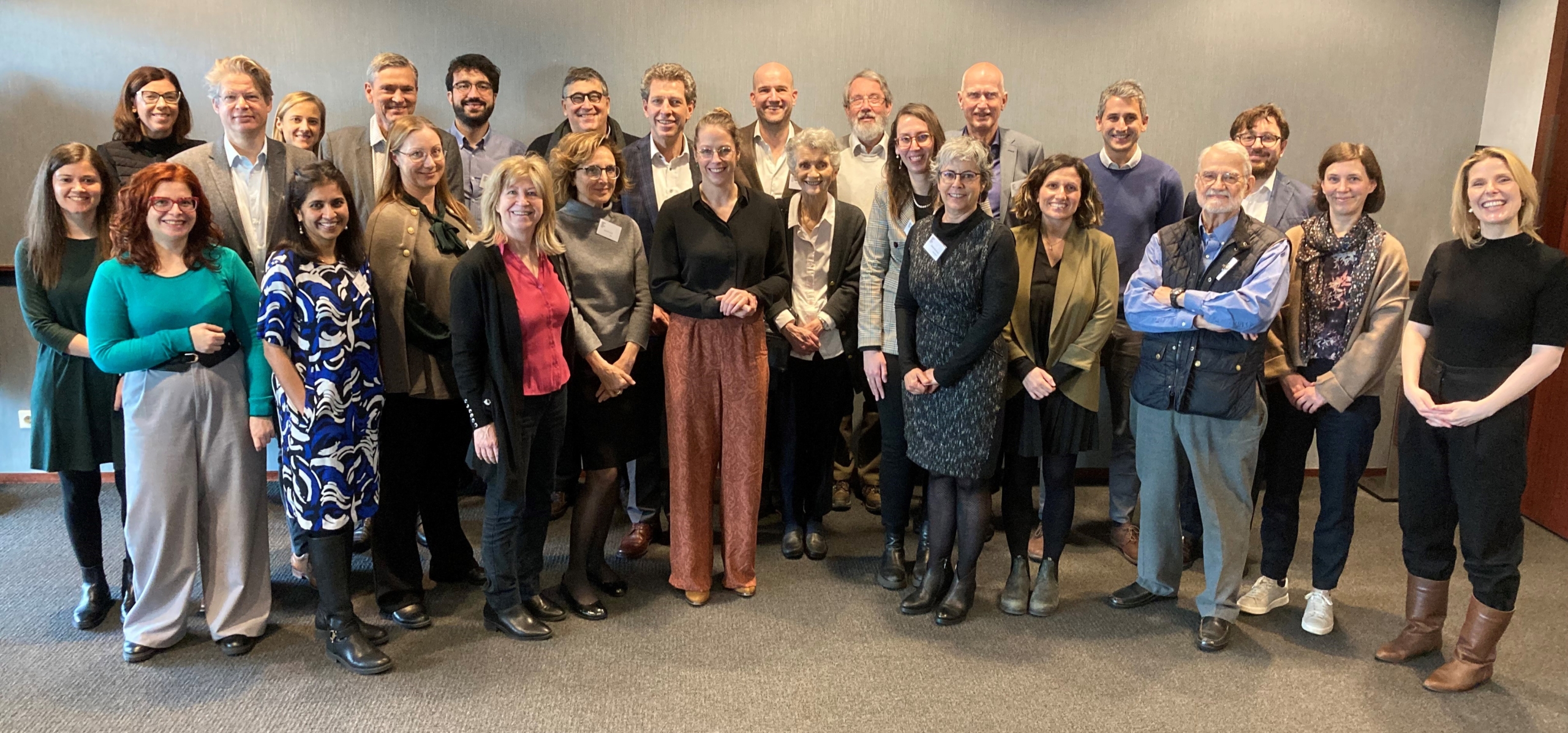Seronegative MG: An update paradigm for diagnosis and management
- Number 275
- Date 9 February 2024
275th ENMC International Workshop
Location: Hoofddorp, The Netherlands
Title: Seronegative MG: An update paradigm for diagnosis and management
Date: 9-11 February 2024
Organisers: Prof Amelia Evoli (IT), Dr Lorenzo Maggi (IT), Prof Jacqueline Palace (UK), Prof Jan Verschuuren (NL)
Translations of this report:
Dutch: Mr Johan Voerman
German: Dr Sarah Hoffmann
Italian: Mrs Maya Ucchedu
Spanish: Dr Daniel Natera
Swedish: Dr Anna Rostedt-Punga
Norwegian: Prof Nils Erik Gilhus
Danish: Prof John Vissing
Participants:
Prof John Vissing (Denmark), Dr Anthony Behin (France), Dr Sarah Hoffmann (Germany), Prof Ulrike Schara-Schmidt (Germany), Dr Marta Cheli (Italy), Dr Valentina Damato (Italy), Prof Amelia Evoli (Italy), Dr Lorenzo Maggi (Italy), Dr Renato Mantegazza (Italy), Dr Gregorio Spagni (Italy), Mrs Maya Uccheddu (patient representative, Italy), Dr Erik Niks, (the Netherlands), Dr Annabel Ruiter (the Netherlands), Dr Martijn Tannemaat (the Netherlands), Prof Jan Verschuuren (the Netherlands), Mr Johan Voerman (patient representative, the Netherlands), Prof Nils Erik Gilhus (Norway), Dr Jeanine Heckmann (South Africa), Dr Elena Cortes - Vicente (Spain), Dr Daniel Natera (Spain), Dr Anna Rostedt Punga (Sweden), Dr Bettina Schreiner (Switzerland), Dr Jackie Palace (UK), Dr Sithara Ramdas (UK), Prof Angela Vincent (UK), Prof Donald Sanders (US).
ENMC hosted a group of experts on Seronegative MG (SNMG) from February 9-11, 2024 in Hoofddorp, The Netherlands.
Myasthenia Gravis (MG) is an autoimmune disorder characterized by muscle weakness and fatigability, with broad phenotypic variability ranging from isolated ocular symptoms to severe generalized disease and life-threatening respiratory dysfunction. MG is caused by autoantibodies targeting antigens of the neuromuscular junction, most commonly the acetylcholine receptor (AChR, 80-85%) and Muscle-specific tyrosine kinase (MuSK, 5-6%). Around 10-15% of patients have no detectable autoantibodies (using routinely available antibody tests), a condition named seronegative MG (SNMG). Clinical recognition of MG and early diagnosis are crucial for the use of appropriate treatments, which are very effective and can restore neuromuscular transmission, with significant clinical improvement in the majority of patients. In general, the diagnosis of autoimmune MG is based on typical clinical signs and symptoms and supported by either electrodiagnostic tests, which demonstrate the presence of a neuromuscular junction transmission disorder, or by the presence of serum autoantibodies, which indicate the autoimmune pathogenesis. Several antibody assays are currently available, each characterized by a different sensitivity and specificity, as well as specific advantages, limitations and availability. However, even with the most advanced detection techniques such as live cell-based assays (CBA), no antibodies can be identified in a small amount of MG patients. In these cases, electrodiagnostic studies and, to a lesser extent, response to cholinesterase inhibitors (ChE-I) or in some cases a very typical pattern of clinical muscle weakness, are highly useful to confirm a neuromuscular transmission disorder. Nonetheless, establishing MG diagnosis in patients with no detectable antibodies may be very challenging, with a substantial risk of misdiagnosis with some of its mimics, such as congenital myasthenic syndromes or mitochondrial myopathies. Moreover, detection of antibodies is also very relevant for the access to innovative therapies recently approved for the treatment of MG with antibodies to AChR, such as complement inhibitors and Fc neonatal receptor blockers.
The aims and objectives of the ENMC Meeting were to review the current knowledge on SNMG clinical and nonclinical features, including prognosis and response to treatments, to establish diagnostic criteria for SNMG, and to define the appropriate management for SNMG. The Workshop´s main goals were (1) to provide a diagnostic algorithm for SNMG, (2) to summarize current knowledge about pathophysiology and natural history of SNMG and identify open questions to be addressed in future research studies, and (3) to define patients` unmet clinical needs.
The Meeting started with a series of talks addressing the core topics of the workshop: major concerns in SNMG, clinical characteristics differentiating seronegative and antibody-positive MG, and a critical appraisal about whether the current guidelines are sufficient to diagnose SNMG. Thereafter, the talks and the discussion were focused on the differential diagnosis of SNMG, CMS and pediatric MG. The first day of the workshop was closed focusing on the patient perspective, including the contribution of two patient representatives. During the second day several aspects of SNMG were covered and lively discussed by the experts, including antibody testing techniques, electrodiagnostic studies and other diagnostic tools, demographic and clinical data on SNMG, as well as conventional immunotherapy and novel target treatments.
During the last day, after reviewing the latest evidence with experts from Europe, South Africa and the US, the workgroup developed a diagnostic flowchart for SNMG with clear advice on antibody assays as well as other tests, and a focus on the clues for the differential diagnosis of SNMG.
The availability of a diagnostic flow chart will likely lead to an improved diagnosis of SNMG and recognition of alternative diagnoses, like e.g. congenital MG or a functional neurological disorder, ultimately resulting in improved patient care.
The future projects identified were to collect more data on natural history and treatment effects in SNMG, to create an European study group on SNMG, and to further evaluate and compare the performance of different antibody assays for SNMG serological diagnosis.
A full report is published in Neuromuscular Disorders (PDF).

